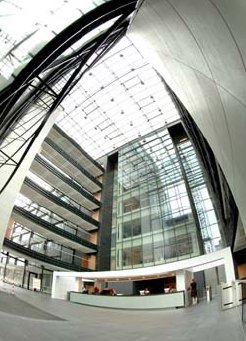A change of job, a change of environment, after 10 years, what it is good for (anyway)?
An answer to this question is hard to come by. Chances are that after a few months,
ALCAIC will have evolved away from trying to answer it. Or so I hope. Initially however, the main reason for it to exist is to document my move from academica to ... to what, exactly? Frankly, I do not know.
The sudden change in itself generates a number of obvious questions. Let me keep the "why?" and "why now?" for a future post. The "why Alcatel?" is easy on the surface: because they asked.
Network dynamics
Networks are funny things. Ask any physicsist/engineer and they will tell you stories about feedback and coupling, instabilities and emergent properties. Small changes to the input can generate large changes in the state of the system. Chaos, quoi. Behaviour so unpredictable that it appears to be random. The verb here is
appears.
People are funny creatures. Ask any psychologist/emotionally intelligent person and they will tell you stories about feedback and coupling - uh, wait a second. Anyway, people can be preoccupied and unhappy with their current situation but still in a stable state. After all, we are or try to be rational (linear?) beings, no? Small changes to our environment do no cause (most of) us to become unstable, to
switch, if you want. Enter the network.
Although we can try and stay at a fixed point, our preoccupied state of mind generates signals which drive your social network into 1) generating feedback and 2) rapidly changing its global state around you. This is exactly the counterintuitive value of a good network: the bigger it is, the better it can react. Some HR people will say "let the network work for you", and that is in my opinion spot on. But beware of the genie in the bottle that acts on all your wishes. Small wishes can have large consequences.
Anyway, my social network picked up on my signals, provided feedback and just before the holidays Alcatel called and asked me if I could send my CV and come over for a discussion about possible interesting opportunities. They were interesting and there you go. So now I have anecdotal evidence that networking works - the next step is figuring out how to do it in a controlled way. Chaos control, anyone?
Coincidence ?
But maybe all of the above is just rationalisation, and it was all guided by a secret consipracy of freemasons. I was meant to go to Alcatel. After all, the prominent use of an inverted triangle (piramid) in both logos is suspicious, no?

Next to this, the name Alcatel comes from "Société Alsacienne de Constructions Atomiques, de Télécommunications et d' Electronique". And wasn't this region a known centre of masonic activities with the presence of e.g. Philippe-Jacques Franck, a freemason and one of the wealthiest and most influential personalities in Strasbourg (bonus points if you can tell me where
the conference on photonics is organized every 2 years). And don't tell me you cannot see other obvious clues...

 This piece by William Safire in the On Language section of the NYT had me smiling/resonating all the way to the office.
This piece by William Safire in the On Language section of the NYT had me smiling/resonating all the way to the office.







